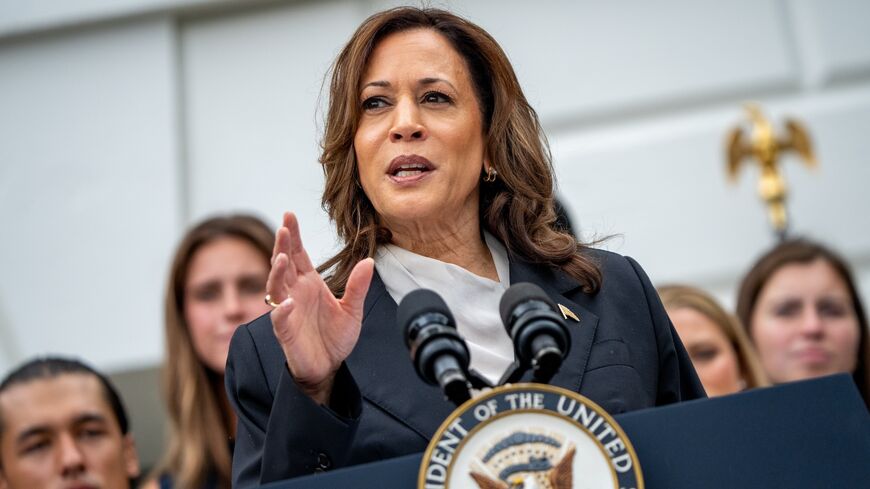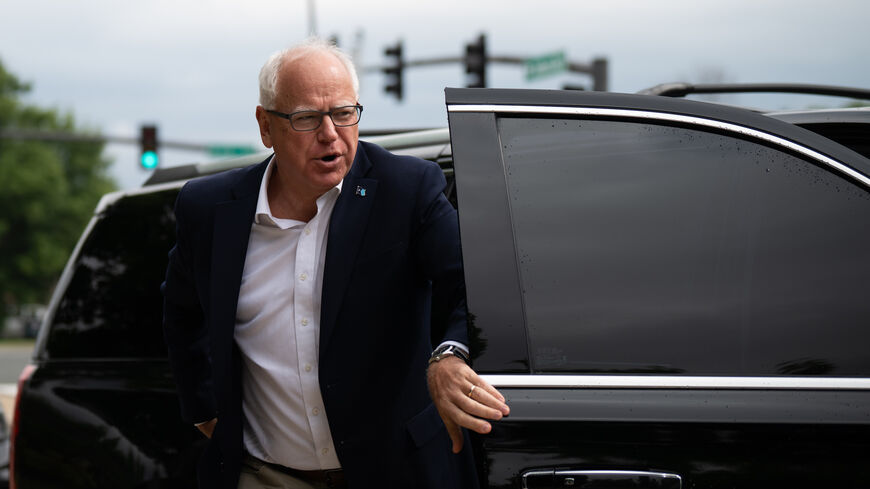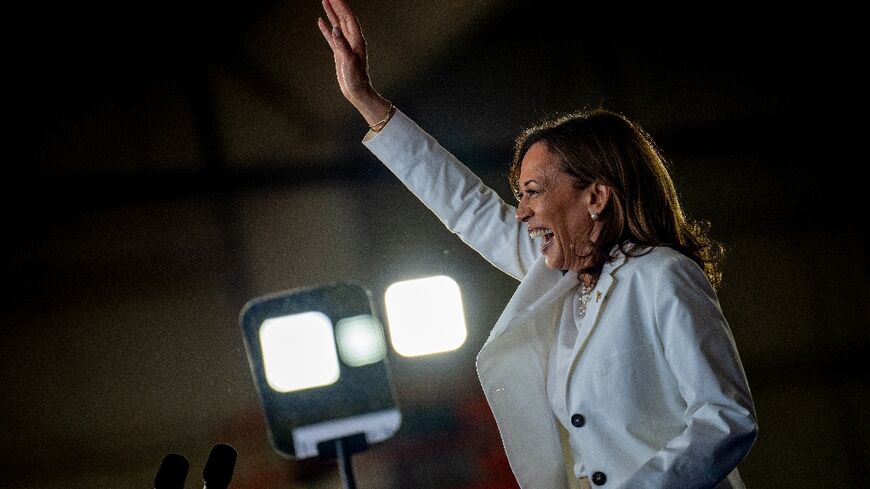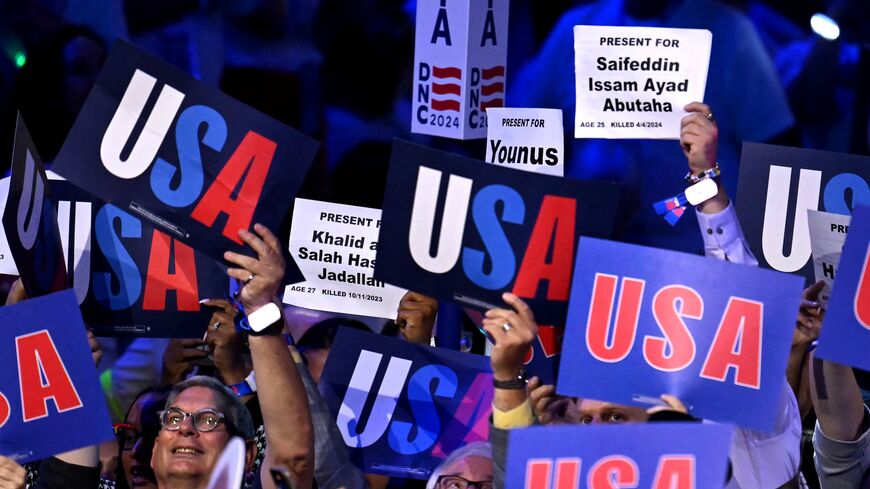Who is Nasrina Bargzie, Kamala Harris’ liaison to Arab and Muslim voters?
Bargzie previously advised Vice President Harris on the Gaza war. Her appointment follows cautious optimism within the Arab American community over Harris' policies in contrast to President Joe Biden on Israel.

US Vice President Kamala Harris has tapped her aide Nasrina Bargzie to help build support among Arab and Muslim voters, according to a Tuesday report, as the campaign seeks to navigate the potential backlash among the community over the Gaza war.
NBC News reported that the Harris campaign had selected Bargzie to lead outreach to Arab and Muslim voters.
Who is Bargzie? Bargzie worked as associate counsel to the vice president when Harris took office in January 2021. Then in May 2022 she became deputy counsel to the vice president, a position she held until her latest appointment as liaison to the Arab and Muslim community. She was born in Kandahar, Afghanistan, and lived in Pakistan for three years until her family was accepted into the United States as refugees, according to NBC. She is fluent in Pashto.
Bargzie was involved in the National Strategy to Counter Antisemitism the White House rolled out in May of 2023, according to a Harris campaign spokesperson.
"Nasrina helped implement the country's first strategy to combat antisemitism in the White House. We are proud to add her to the campaign,” Lauren Hitt, spokesperson for the Harris-Walz campaign, told Al-Monitor.
Before joining Harris’ office, Bargzie’s experience included a clerkship at the US Court of Appeals for the Ninth Circuit in San Francisco, a fellowship at the American Civil Liberties Union and a senior staff attorney position with the Asian Law Caucus, a civil rights organization. She has also lectured at Stanford Law School and worked at law firms including the New York City–based Boies Schiller Flexner LLP, according to Business Insider.
Bargzie’s work at Boies Schiller Flexner LLP included leading a project on civilian casualties in Afghanistan and Iraq, according to an archived Asian Law Caucus web page.
Bargzie took on issues related to pro-Palestinian activism while with the Asian Law Caucus. In 2013 the US Department of Education dismissed complaints against three University of California schools alleging that protests against Israel on campus created a hostile environment for Jewish students.
“The organized legal bullying campaigns have failed,” said Bargzie of the complaints, the left-wing Center for Constitutional Rights, which worked with the caucus on the matter, reported at the time.
Bargzie holds a Juris Doctor from Berkeley Law School, one of the institutions named in the 2013 complaint, according to NBC.
In 2008, Bargzie criticized detentions at the US military’s Guantanamo Bay detention camp in Cuba.
“Indefinite detention without due process is illegal under our Constitution, antithetical to the American way, and would have made our founding fathers gasp in horror,” she wrote for the ACLU.
Why it matters: Bargzie’s appointment comes as Harris attempts to regain lost ground with Arab American voters who have rejected the Biden administration's position on the Gaza war, with its unconditional support for Israel in the conflict.
The Associated Press reported late last month that Harris quickly pivoted toward building support among Arab American voters in Michigan — a battleground state that could prove pivotal in the election — after Biden dropped out of the presidential race. Some leaders in the community, including Dearborn Mayor Abdullah Hammoud, are “watching closely for signals that Harris will be more vocal in pressing for a cease-fire.” However, the vice president “will need to walk a fine line not to publicly break with Biden’s position on the war in Gaza,” the outlet reported.
There has been some optimism in the Arab American community now that Harris is the presumptive Democratic Party nominee. Activist Abbas Alawieh, who co-founded the movement of voters to cast "uncommitted" ballots in the Democratic presidential primaries, told reporters earlier this month that he sees an “openness” from the Harris campaign.
“There are early indications that there is an openness to engaging with our movement that feels like a shift from how our requests were being treated previously of the Harris campaign,” he said, according to National Public Radio.
The “uncommitted” movement was started in opposition to Biden’s support for Israel in the Gaza war.
As vice president, Harris has both criticized Israel’s conduct in Gaza and expressed support for its actions against Hamas and Hezbollah as well as demonstrated sympathy for Palestinian civilians affected by the war.
Know more: Harris named Ilan Goldenberg as her liaison to the Jewish American community, the Jewish Telegraphic Agency reported on Monday. A campaign aide told Jewish Insider that Goldenberg will be the “main liaison with the Jewish community” and will advise on “the US-Israel relationship, the war in Gaza and the broader Middle East.”
The Israeli-born Goldenberg was a senior professional staff member for the Senate Foreign Relations Committee from 2013 to 2015. Before that he was special adviser on the Middle East and later Iran team chief in the Office of the Under-Secretary of Defense for Policy from 2009 to 2012, during the Obama administration.
Goldenberg outlined his views on the region in a late 2020 report he co-wrote for the Center for a New American Security. Goldenberg and co-authors Michael Koplow and Tamara Cofman Wittes called for a new approach to the Israeli-Palestinian conflict, advocating for the United States to “promote freedom, security, and prosperity” and work toward a negotiated solution to the conflict.
The report lamented Israel’s “occupation and territorial expansion in the West Bank and East Jerusalem.” It further noted that “Palestinian governing institutions are eroding, opaque, and unaccountable” and that “the Palestinian political leadership and people are divided between an extremist Hamas in Gaza and a weakening Fatah-led Palestinian Authority in the West Bank.”
Goldenberg has censured the Trump administration’s approach to the conflict. In a 2017 op-ed for Politico, Goldenberg criticized then President Donald Trump’s reported plans to move the US Embassy from Tel Aviv to Jerusalem, calling the disputed city “the most sensitive of all final-status” issues between Israel and the Palestinians. Trump recognized Jerusalem as Israel’s capital and decided to move the embassy later that year.








